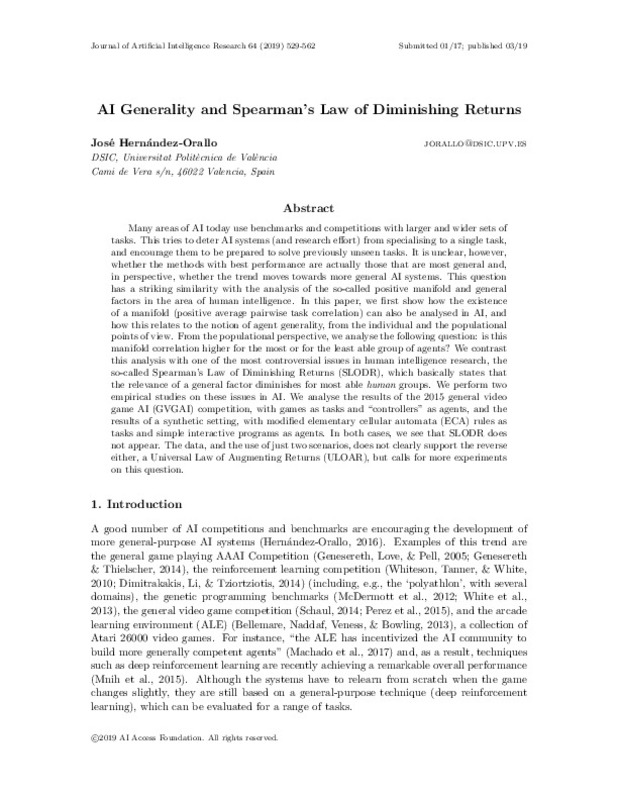JavaScript is disabled for your browser. Some features of this site may not work without it.
Buscar en RiuNet
Listar
Mi cuenta
Estadísticas
Ayuda RiuNet
Admin. UPV
AI Generality and Spearman's Law of Diminishing Returns
Mostrar el registro sencillo del ítem
Ficheros en el ítem
| dc.contributor.author | Hernández-Orallo, José
|
es_ES |
| dc.date.accessioned | 2020-04-06T08:57:19Z | |
| dc.date.available | 2020-04-06T08:57:19Z | |
| dc.date.issued | 2019 | es_ES |
| dc.identifier.issn | 1076-9757 | es_ES |
| dc.identifier.uri | http://hdl.handle.net/10251/140239 | |
| dc.description.abstract | [EN] Many areas of AI today use benchmarks and competitions with larger and wider sets of tasks. This tries to deter AI systems (and research effort) from specialising to a single task, and encourage them to be prepared to solve previously unseen tasks. It is unclear, however, whether the methods with best performance are actually those that are most general and, in perspective, whether the trend moves towards more general AI systems. This question has a striking similarity with the analysis of the so-called positive manifold and general factors in the area of human intelligence. In this paper, we first show how the existence of a manifold (positive average pairwise task correlation) can also be analysed in AI, and how this relates to the notion of agent generality, from the individual and the populational points of view. From the populational perspective, we analyse the following question: is this manifold correlation higher for the most or for the least able group of agents? We contrast this analysis with one of the most controversial issues in human intelligence research, the so-called Spearman's Law of Diminishing Returns (SLODR), which basically states that the relevance of a general factor diminishes for most able human groups. We perform two empirical studies on these issues in AI. We analyse the results of the 2015 general video game AI (GVGAI) competition, with games as tasks and "controllers" as agents, and the results of a synthetic setting, with modified elementary cellular automata (ECA) rules as tasks and simple interactive programs as agents. In both cases, we see that SLODR does not appear. The data, and the use of just two scenarios, does not clearly support the reverse either, a Universal Law of Augmenting Returns (ULOAR), but calls for more experiments on this question. | es_ES |
| dc.description.sponsorship | I thank the anonymous reviewers of ECAI'2016 for their comments on an early version of the experiments shown in Section 4. I'm really grateful to Philip J. Bontrager, Ahmed Khalifa, Diego Perez-Liebana and Julian Togelius for providing me with the GVGAI competition data that made Section 3 possible. David Stillwell and Aiden Loe suggested the use of person-fit as a measure of generality. The JAIR reviewers have provided very insightful and constructive comments, which have greatly helped to improve the final version of this paper. This work has been partially supported by the EU (FEDER) and Spanish MINECO grant TIN2015-69175-C4-1-R, and by Generalitat Valenciana PROMETEOII/2015/013 and PROMETEO/2019/098. I also thank the support from the Future of Life Institute through FLI grant RFP2-152. Part of this work has been done while visiting the Leverhulme Centre for the Future of Intelligence, generously funded by the Leverhulme Trust. I also thank the UPV for granting me a sabbatical leave and the funding from the Spanish MECD programme "Salvador de Madariaga" (PRX17/00467) and a BEST grant (BEST/2017/045) from the Generalitat Valenciana for another research stay also at the CFI. | es_ES |
| dc.language | Inglés | es_ES |
| dc.publisher | AI Access Foundation | es_ES |
| dc.relation.ispartof | Journal of Artificial Intelligence Research | es_ES |
| dc.rights | Reserva de todos los derechos | es_ES |
| dc.subject.classification | LENGUAJES Y SISTEMAS INFORMATICOS | es_ES |
| dc.title | AI Generality and Spearman's Law of Diminishing Returns | es_ES |
| dc.type | Artículo | es_ES |
| dc.identifier.doi | 10.1613/jair.1.11388 | es_ES |
| dc.relation.projectID | info:eu-repo/grantAgreement/MECD//PRX17%2F00467/ | es_ES |
| dc.relation.projectID | info:eu-repo/grantAgreement/GVA//BEST%2F2017%2F045/ | es_ES |
| dc.relation.projectID | info:eu-repo/grantAgreement/FLI//RFP2-152/ | es_ES |
| dc.relation.projectID | info:eu-repo/grantAgreement/GVA//PROMETEOII%2F2015%2F013/ES/SmartLogic: Logic Technologies for Software Security and Performance/ | es_ES |
| dc.relation.projectID | info:eu-repo/grantAgreement/MINECO//TIN2015-69175-C4-1-R/ES/SOLUCIONES EFECTIVAS BASADAS EN LA LOGICA/ | es_ES |
| dc.relation.projectID | info:eu-repo/grantAgreement/GVA//PROMETEO%2F2019%2F098/ES/DeepTrust: Deep Logic Technology for Software Trustworthiness/ | es_ES |
| dc.rights.accessRights | Abierto | es_ES |
| dc.contributor.affiliation | Universitat Politècnica de València. Departamento de Sistemas Informáticos y Computación - Departament de Sistemes Informàtics i Computació | es_ES |
| dc.description.bibliographicCitation | Hernández-Orallo, J. (2019). AI Generality and Spearman's Law of Diminishing Returns. Journal of Artificial Intelligence Research. 64:529-562. https://doi.org/10.1613/jair.1.11388 | es_ES |
| dc.description.accrualMethod | S | es_ES |
| dc.relation.publisherversion | https://doi.org/10.1613/jair.1.11388 | es_ES |
| dc.description.upvformatpinicio | 529 | es_ES |
| dc.description.upvformatpfin | 562 | es_ES |
| dc.type.version | info:eu-repo/semantics/publishedVersion | es_ES |
| dc.description.volume | 64 | es_ES |
| dc.relation.pasarela | S\406525 | es_ES |
| dc.contributor.funder | Generalitat Valenciana | es_ES |
| dc.contributor.funder | Future of Life Institute | es_ES |
| dc.contributor.funder | Ministerio de Educación, Cultura y Deporte | es_ES |
| dc.contributor.funder | Ministerio de Economía y Competitividad | es_ES |








